Peter MALONE
Saturday, 18 September 2021 19:58
Creed
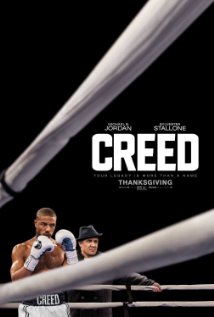
CREED
US, 2015, 133 Minutes, Colour.
Michael B.Jordan, Sylvester Stallone, Tessa Thompson, Phylicia Rashad, Tony Bellew,Graham McTavish?.
Directed by Ryan Coogler.
Those who saw the original Rocky film might scarcely believe that it is almost 40 years since it was released, was extraordinarily popular, won the Oscar for best film. Sylvester Stallone invested a lot of in this character, not only in performance, but writing the screenplay and writing sequels and directing some of them? He even made a comeback in 2006 with Rocky Balboa.
Somebody had the bright idea – and, box-office wise, it is a bright idea – to imagine that Apollo Creed, Carl Weathers in the original films, had an illegitimate son who found out who his father was and wanted to become a boxer, had successful fights under the radar in Mexico, had grown up after his time in juvenile detention to become a successful businessman. But, he wants to give up all this in order to box, to make his own way in the tradition of his father, but using his mother’s name to avoid capitalising on his father’s reputation. He is played by Michael B.Jordan who was the star of the director, Ryan Coogler’s social drama, Fruitvale Station.
So, off he goes to Philadelphia to track down Rocky – Sylvester Stallone at 69. He finds him in his restaurant, but Rocky feels that he is old and cannot consent to train the young man. But, his memories come back, remembering Apollo Creed and his death, but also remembering Adrian his wife and Paulie his trainer, even going to the cemetery to sit with them at their graves and read the news to them. And so, of course, he does decide to train the young man, and there are plenty of vigorous training sequences – vigorous for Adonis Creed, calling himself Donnie Johnson, from his mother’s name, not so vigorous for Rocky himself.
Rocky is not as healthy as he might have imagined and, remembering the death of Adrian and the ineffectiveness of chemotherapy, he decides against it until Adonis challenges him to fight and win with him.
The screenplay, of course, works in a romance, featuring Tessa Thompson as a singer in a club whose loud music in her apartment disturbs Adonis but, when he sees and hears her singing, falls for her and she for him. They get on well together, though there is a falling out when Adonis, angry at Rockies illness, loses his temper with one of her support band members and it looks as if there may might be a serious break.
A Rocky film would not be a Rocky film without a final 12 round boxing battle. This time it is in England, in Liverpool, with the world heavyweight champion, “Pretty” Ricky Conlon. Adonis is the underdog but, by the 12th around, even non-boxing fans will be on his side.
Of course, the screenplay is open to a sequel, to Creed 2 – and initial box office results should be strong enough to persuade Hollywood to make the sequel.
1. The popularity of Rocky films? The tradition of the sequels? In the 1970s to the 21st century?
2. An inventive story, Rocky and his ageing, coaching? The new generation?
3. Philadelphia setting, familiar from the earlier films, the restaurant, the gyms, interiors, the boxing rings? Los Angeles and juvenile detention? Liverpool, the press conference, the boxing stadium? The feel of the boxing film?
4. The musical score, the new songs, the echoes of the Rocky themes?
5. The title, memories of Apollo Creed? His interaction with Rocky? Adonis, in juvenile detention, the background of his father and illegitimacy, his fighting, life, Apollo’s wife to visit, her offer, becoming his mother, and Adonis growing up?
6. Donnie, his education, his good job, the Mexican fights, the wins? His desire to box, the memory of his father? His motivations, his job promotion, resignation? Leaving his mother, leaving LA?
7. Going to Philadelphia, going to the restaurant, meeting Rocky, the introduction, discussion, his request for training? Going to the gym, the detailed sequences of his training? The trainer and his son, practice, bouts? The clientele of the gym, the trainers?
8. Sylvester Stallone reprising the role of Rocky, 40 years since the initial film, the spirit of Rocky, the sequels, with Apollo Creed, Creed’s death? Rocky and his age, his sadness at the death of Adrian and Paulie, going to the cemetery, reading the paper to them? His interest in Adonis, his memories, go to Donnie, offering to coach, the scenes of training, his sitting and reading the paper…?
9. Rocky’s collapse, the diagnosis, in hospital, not wanting chemotherapy, memories of Adrian’s chemotherapy and death? Not telling people, the brochures in his pocket, Donnie finding them, urging him to fight his cancer? The deal for both of them trying to win?
10. The English phone call, the deal, “Pretty” Ricky Conlon and his reputation, wanted by the police, breaking the jaw of his opponent at the press
conference, his manager and the discussions, the buildup to the press conference with Donnie, his taunting him? Rocky keeping the peace?
11. Donnie, his apartment, not going by his name, the nickname Hollywood, the loud music, meeting Bianca, going to the club, hearing her singing, wanting to take her out, the talk, her progressive deafness, bonding and sharing, the support group at the club, Donnie losing his temper, fighting, his anger and Bianca’s reaction?
12. The clash with Rocky, the reconciliation? His win in the fight, the discussions on television about his status, illegitimacy, his father?
13. Going to England, the press conference, in the dressing room, the preparations, rocky and his advice, the 12 rounds, the experience of the fight, Rocky watching and encouraging, Bianca watching, the commentators? His mother watching on TV?
14. The final round, the points, Conlon winning, the moral victory for Adonis, Conlon encouraging him to be his successor as champion?
15. The finale, the famous Philadelphia steps, Rocky’s past running up, now climbing slowly, with Adonis, looking back to the past, looking to the future?
Published in Movie Reviews
Published in
Movie Reviews
Tagged under
Saturday, 18 September 2021 19:58
Danish Girl, The
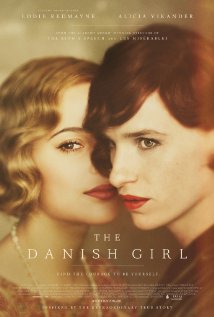
THE DANISH GIRL
UK, 2015, 120 minutes, Colour.
Eddie Redmayne, Alicia Vikander, Matthias Schoenaerts, Ben Whishaw, Sebastian Koch, Amber Heard.
Directed by Tom Hooper.
An emotional and challenging film.
The screenplay is based on actual characters and events, with a setting in Copenhagen in 1926. It is the story of Einar and Gerda Wegener and issues of gender and transgender surgery. This was rare in the 1920s as well as in succeeding decades but the issues are relevant today.
This is a very handsome film to look at, beautiful photography recreating the period, using Norwegian locations for coastal sequences, views of Copenhagen at the time, some time spent in Paris, Dresden as the scene for the surgery.
The Danish Girl has been directed by Tom Hooper, who made a television impact with his series on Elisabeth I, who won an Oscar for directing The King’s Speech and was also nominated for Les Miserables.
The successful impact of the film depends on the central performance by Eddie Redmayne. Tom Hooper had directed him as Marius in Les Miserables. And then, surprisingly, Redmayne won the Oscar for best actor, 2014, for his portrayal of scientist Stephen Hawking in The Theory of Everything. His performance here has Oscar and other awards potential.
Not every actor could be cast as Einar Wegener. Redmayne has a slight build and so makes the gender issues credible, observing his body, speculating on what it would like to be female. But, with the first part of the film, he has to play the Danish artist, Einar Wegener, and establish that he was male. However, because the film is not a documentary but a drama, the screenplay has to make suggestions that Einar is not comfortable in his body, that he has had some female feelings, posing for his wife, Gerda, wearing stockings and a dress, feeling the texture of the materials, becoming more and more comfortable as female, appearing as female, dressing as female. This is tested out, Gerda doing the dressing and the make up, when he goes to a party and is taken for a woman. Lili is the name that he chooses for this inner self.
While Gerda, a beautiful performance by Alicia Vikander (her films of 2015 include The Testament of Youth, Ex Machina, Burnt), is supportive of her husband, his withdrawing from being Einar and allowing his inner Lili to emerge, finds it difficult, has a need for her husband. She paints and sketches him as Lili and her agent arranges for her to go to paint and exhibit in Paris. Lili is very comfortable in Paris, not painting, working as a shop girl in a store.
Childhood friend, Hans (Matthias Schoenaerts, Gabriel Oak in Far from the Madding Crowd) comes to visit and offers his help. Doctors examining the case offer frightening solutions including electric shock, holes in the head, straitjacket internment in an institution… However, a German doctor in Dresden has developed procedures for transgender surgery and Lili agrees to undergo the changes.
Statistics indicate that there are many transgender people in society but most people do not encounter them, learning about the situation principally from the media. The film offers a significant opportunity for reflecting on this gender situation, its consequences on the psyche of a person, on their social place in the world, on the desire for some kind of solving of the personal dilemmas. With its setting of the 1920s, audiences will find the film easier to look at and reflect on, a touch more detachment because of the past – but still the challenge is in the present.
Over the decades, there have been a number of films about transgender surgery including: The Christine Jorgensen Story, 1970, based on a real life situation in Denmark in the 1950s; I Want what I Want, 1972, with Anne Heywood; Second Serve, 1986, with Vanessa Redgrave as Dr Renée Richards, the tennis champion and surgeon, and Carlotta, with Jessica Marais, about the entertainer from King’s Cross, screened on ABC television in 2014. Unlike The Danish Girl, the last three films featured an actress portraying a man becoming a woman.
1. The impact of the film? Theme, production, photography, performances?
2. A true story, the 1920s, gender issues at the time, since, now? The development of treatments?
3. Copenhagen, views of the city, from the 1920s, buildings, streets, apartments, interiors, studios, galleries? Paris and the exteriors, apartments, galleries? Dresden, the city, the hospitals? Views of Norway, the coast, mountains? The musical score?
4. The title, as mentioned in relation to Gerda? In relation to Lili?
5. Audience interest in the situation, in characters, the personal and moral issues, medical, psychological? Response? Contemporary issues of the public, legal ramifications? The story set in the past and consequently more detached for a contemporary audience, easier to watch and interpret? Applications to the present?
6. The opening settings, the mountains, lakes, Einar’s painting, continually being viewed, his continuous working on it, nature, its relationship to his past, to Hans, the end and Gerda’s insistence on visiting the scene with Hans?
7. The reproduction of the paintings from both of the artists? Adapting Gerda’s paintings with Eddie Redmayne’s face, Alicia Vikander’s face?
8. The introduction to Einar and Gerda, six years married, the life together, their love, comfortable with each other, their work, his nature painting, her portraits, the dog in the studio – and being told to sit (and the reaction of the pompous man posing)? Acclaim for Einar? Gerda going to visit the agent, his comments, rejection? Einar and his interventions for her, her tension? But love overcoming the tension, peace at home?
9. Einar as a character, his build, slight, his being introverted, the story about Hans and the past, their friendship, the dress, Einar’s father and his berating Hans? Art studies, his story about being attracted by Gerda’s ankle, going out together, marrying, their life, love, no children?
10. Their friends, Gerda and Ulla, the chats, going to the social, dancing, flirting?
11. The portrait of the couple, issues of gender, the initial part of the film contriving to indicate Einar’s sexuality and gender issues? As distinct from a documentary?
12. The performance of Eddie Redmayne, building of his character, manner, slight build, marriage, putting on the stocking with the dress for posing for Gerda? Ulla coming in, responding? His response to the clothes, the texture, wearing, the change of image, make up, movement, Lili emerging? Gerda and her sketches, paintings – and his discovering his inner Lili? His looking in the mirror, posing and shaping his body as female?
13. The decision to go to the function, the preparation, make up, the wig and buying the clothes? Going, giggly, girly? The encounter with Eric, talking with him, whether he knew or not, his comments about Einar’s paintings? The attempt to kiss? Men looking at Lili, nervousness? Lili liking this response, Gerda reacting to the kiss? Einar and his continuing to visit Eric as Lili?
14. Allowing Lili to come out, Einar withdrawing, Lili taking over, Gerda and her requests for him to stay sometimes?
15. Lili staying, his not painting, the need for help, the range of doctors and their opinions, his behaviour, dreams? The collage of medical opinions, shock treatment, holes in head, straitjacket – and his escape?
16. Gerda showing her paintings to the agent, the invitation to go to Paris, Lili going as well, the quiet life, painting, the promotion of the show, work and the apartment? Lili working in the store, with the other shopgirls, perfumes, feminine behaviour?
17. Gerda visiting Hans, his remembering the story, their outings together, at the restaurant, Lili not coming? Hans coming to the apartment, discovering Lili, his offering to help? Gerda sending him away? The opening, Gerda in the rain, needing Einar and his inability to respond?
18. The doctor, interest in the case, his skills and procedures, the information, the interview, the possibilities, Lili and hope, the decision to go, the nature of the operation, his wanting Gerda to be there, the effect, going to the hospital, the interviews, giving the name Lili Elbe? The recuperation and its effect? Wanting to go back to Denmark?
19. Eric, the meeting with Lili, Gerda asking about it, Lili saying it was not sexually emotional, the effect on Gerda?
20. Time passing, wanting to go back to Dresden for the second operation, Gerda not wanting to collaborate in any harm to him? His plea, her going, Hans going? Their support?
21. The operation, its effect, the words of the doctor, the treatment, the fever?
22. Lili’s dream, mother holding the baby and calling her Lili? Death?
23. Lili, the journals, turning them into a book that 1930s, offering insight into the gender issues?
24. The aftermath, Hans and Gerda going to the countryside, seeing Einar’s landscape? Gerda continuing to paint?
25. The effectiveness of this kind of drama, dramatising complex issues, offering insight and emotional response to the audience?
Published in Movie Reviews
Published in
Movie Reviews
Tagged under
Saturday, 18 September 2021 19:58
I Am Here/ The 11th Hour
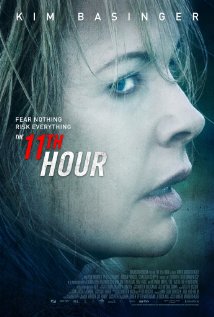
I AM HERE/ THE 11th HOUR
Denmark, 2014, 97 minutes, Colour.
Kim Basinger, Jordan Prentice, Sebastian Schipper, Peter Stormare, Anouk Wagener.
Directed by Anders Morgenthaler.
This Danish film is about a woman in middle-age (Kim Basinger) who is desperate to have a child having suffered many miscarriages. She fantasises about the child, hearing a voice calling to her? When the doctors say she has no hope of conceiving and her husband is reluctant to adopt, she hears about prostitutes in Eastern Europe with children for sale and decides to go to find one.
In the Czech Republic, she comes across Petit (Jordan Prentice), a dwarf who does casual labour whom she gives a lift to, his wanting a drug fix, her wanting him to find a baby. In fact, he does, bargaining with a 15-year-old prostitute and giving her money, bringing the baby to the woman. However, the Russian pimp (Peter Stormare) confronts the woman, takes the baby, treats the woman violently but is attacked and wounded. The woman rings her husband to discover that she has been absent for four months with everybody concerned about her. She does a pregnancy test – and an indication of what could be her future, with a child.
1. A story about a woman, ageing, marriage, wanting a child, miscarriages, her husband giving up, her desperation, to steal a child or pay for a prostitute’s child?
2. A Danish film, the Copenhagen setting, travel to the Czech Republic, the civilisation of Denmark, homes, business offices, contrasting with Eastern Europe, the roads, the prostitutes, the pimps and violence?
3. The visual style, the blurring at the opening, the focus of sequences, composition of shots, realist and surrealist? Maria and hearing the voice of the child talking with her? Musical score?
4. Kim Basinger as Maria? Age, experience, seeing her at work, business management? At home, her relationship with Peter? Love? The blood on the bed, the miscarriage? The discussions with the doctor, Maria’s refusal to accept that she could not have children? Peter giving up, not wanting to adopt, travelling, staying away from home, at a hotel? Maria going, pleading?
5. Her assistant, the work of the women, her hearing about the prostitutes, the children in Eastern Europe? Her determination to go? Driving all the way?
6. Her being out of place in this milieu, seeing Petit, dwarf, his work, on the road, picked up, his need for a fix, her arranging this, her asking him to find the
child, his reluctance? Going into the woods, her offering him the money, his agreement?
7. Petit, looking for the fix, finding the prostitutes, with a 15-year-old girl, the money, her wanting to have sex with him, his resistance, wanting the drugs, looking in the cupboard, finding the baby?
8. His discussions with the girl, her reluctance, offering the money? Taking the child, finding Maria, Maria being overwhelmed? Their driving, going to the hotel, his buying things for the baby, Marie attending the baby?
9. The arrival of the Russian, the confrontation, and his brutality? The girl present? Taking the child? Maria later finding him battered?
10. Maria and Petit, the money, his going on his way?
11. Her phoning her husband, the fact that she had been away for four months, the disappearance, everybody’s concern?
12. The irony, the treatment by the Russian, sexual assault (offscreen), her pregnancy test – and her future?
Published in Movie Reviews
Published in
Movie Reviews
Tagged under
Saturday, 18 September 2021 19:58
3000 Miles to Graceland
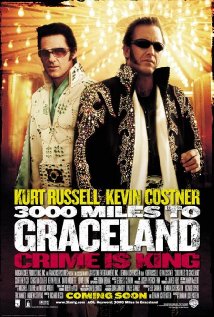
3000 MILES TO GRACELAND
US, 2001, 125 minutes, Colour.
Kurt Russell, Kevin Costner, Courtney Cox, Christian Slater, Kevin Pollak, David Arquette, John Lovitz, Howie, Thomas Hayden Church, Bokeem Woodbine, Ice-T, David Kaye.
Directed by Demian Lichtenstein.
3000 Miles to Graceland is true pulp fiction, action, violence and brutality, complete villains, thieves betraying thieves, police pursuit, exploitation of woman and child, comeuppance…
This is the story of a group of men, some just out of prison, gathering together to rob a casino at Las Vegas, holding an Elvis lookalike Festival and their disguise as Elvis. The robbery itself is presented quite brutally, with what looks like a complete security guard squad being shot to death. One of the robbers is wounded. They get away with a great deal of money, the leader, Murphy, hastening the wounded man’s death and dispute about dividing up his share. Then Murphy shoots the others. However, one of them, Michael, who seems to be the one with some possible redeeming features, survives.
Michael has encountered a mother and son at a motel, she falling for him, the son stealing the wallet, and a confrontation between Michael and the boy. He then returns with the money and the three drive off to a destination where the stolen money can be exchanged at the going rate for unmarked cash.
The film then becomes a pursuit, the woman betraying Michael and taking the money, going to the rendezvous, encountering Murphy, which leads to some confrontations. In the meantime, the Las Vegas police are tracking down the robbers. It all leads to another big shootout in a warehouse, with Murphy being killed but Michael and the woman and her son, who has always wanted to be a partner with Michael and has helped him, especially getting him out of jail with bail money, finally finishing up with all the money on Michael’s yacht.
Very dubious moral characters, moral tone – in the tradition of American outlaws and someone getting away with the money.
Murphy is played by Kevin Costner in quite a different kind of villain role. Michael, on the other hand, is very much a Kurt Russell role. The associates are played by Christian Slater who turns out to be the greedy one, David Arquette who is the stupid one, Bokeem Woodbine who is the man killed. Courtney Cox, who was appearing in the long-running Friends at the time, gives quite a different performance from her television series. Kevin Pollak and Thomas Hayden Church are the pursuing police. David Kaye is persuasive as the redoubtable young boy.
The final credits are worth looking at, very cheerful, Kurt Russell doing an Elvis impersonation. Actually he had played Elvis in John Carpenter’s 1980s film, Elvis) with all the characters reappearing, joining in the song and Elvis gyrations as well as recapping some of the sequences from the film.
1. A thriller? Robbery? Police pursuit? Falling out among thieves?
2. The desert settings, Nevada, Las Vegas, Idaho, Seattle?
3. The musical score, the range of Elvis songs, the imitators, the commentary with the lyrics, My Way at the end, and Kurt Russell’s impersonation during the final credits?
4. The title, the reference to Elvis, to Graceland, the action taking place on the other side of the country?
5. Michael, out of prison, tough, his manner, meeting Cybil, her son, the attraction, the sexual encounter, the boy stealing his wallet? His return, the confrontation? Cybil and her infatuation?
6. Michael meeting up with Murphy and the rest of the gang, travelling to Las Vegas, the costumes, into the casino, the details of the robbery, the video surveillance, the action of the security men, the ruthless shootings, the massacre of the security guards, one of the thieves being wounded? Their getting away from the roof by helicopter?
7. Dividing up the money, the robber wanting the dead man’s share, the confrontation with Murphy, the doubletalk, Murphy’s ruthlessness, hastening the death of the dead man, shooting the objecter in the leg, killing him? The taking of the body, Murphy shooting at the other three, the deaths, Michael surviving?
8. The police, working together, the leads, the information about Murphy, finding the dead bodies, contacting other police forces, the continued pursuit, the different leads and information, present at the end with the squads?
9. Michael, going back to Cybil, the boy having listened in to the discussions about the division of the money and seeing the shooting? Cybil, fears, ringing 911, cancelling when seeing the money? The police coming, the enquiries, her easy answer that it was a mistake, Michael taking mother and son in the car with the money? Cybil and her still being in love?
10. The diner, going to the ladies’ room, stealing the money, taking the car? The boy wanting to be a partner with Michael? Their stealing the car, going in pursuit?
11. Cybil, the card, the password, Jay and his assistant, the antiques shop, laundering the money? Her phone call? Murphy arriving? The discussions, the jokes about hunting, Murphy not joking? Killing Jay and the assistant? Michael discovering them?
12. Going in pursuit of Murphy, phoning in that the car was stolen, Murphy being arrested and put in jail, Michael in jail? The arguments? The boy posting bail, the lawyer, Michael going before the judge, the boy’s deal? Murphy’s car and Cybil in the boot?
13. Murphy, his contact with John, their past, John rescuing them from the roof of the casino with his helicopter? Getting Hamilton, the hitman?
14. Michael going to the police, doing the deal, going to the warehouse, to exchange the money for the boy, tentative, the bag full of newspaper rather than money, the exchange?
15. The attack of the police, the shootout, the many deaths? John shielding the boy, Murphy giving him the money? Michael being shot and taken by the ambulance? Murphy’s death?
16. Michael taking the ambulance, been padded with the money, not being killed, the three going to his yacht – and a happy ever after?
17. The impact of Kurt Russell doing an Elvis impersonation in the final credits and all the members of the cast reappearing?
Published in Movie Reviews
Published in
Movie Reviews
Tagged under
Saturday, 18 September 2021 19:58
Pearl Harbor
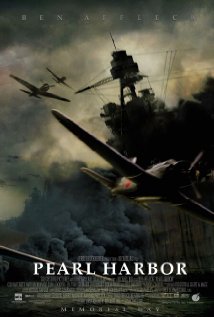
PEARL HARBOR
US, 2001, 183 minutes, Colour.
Ben Affleck, Josh Hartnett, Kate Beckinsale, William Lee Scott, Ewen Bremner, Alec Baldwin, Jaime King, Catherine Kellner, Jennifer Garner, John Voight, Cuba Gooding Jr, Michael Shannon, Matthew Davis, Mako, Carey- Hiroyuki Tagawa, Colm Feore, Dan Aykroyd, William Fichtner, Scott Wilson, Graham Beckel, Peter Firth, Tom Sizemore, Beth Grant, Kim Coates, Erich Christian Olsen.
Directed by Michael Bay.
One of the peculiar aspects of publicising big and expensive films like Pearl Harbor is the hostility that they rouse in some movie journalists, especially journalistic hacks who don't know their films who love nothing better than to cut down high flyers. This is generally sight unseen but it makes sensationalist copy. The onslaught against Pearl Harbor in the weeks preceding its release prophesied that it was a bigger bomb than any dropped sixty years ago. The critics were not kind - which seemed to prove their point. However, on its opening weekend in the United States it grossed over $75.000.000. So, what can one say about the three-hour blockbuster?
The first thing to say is that was not intended by its makers to be a masterpiece of classic cinema and to judge it as if it were would be like criticising a best-seller as if it were a work of literature. Pearl Harbor is a movie best-seller. So was Titanic - which might be a fairer comparison. In that competition, Titanic would win. But, the appeal to the popular audience is the same.
The core of the film is a historical event. The war in Europe had been waged for over two years (1939-1941) before the Japanese attack on the US fleet in Hawaii. President Roosevelt was urging assistance for Europe. However, many expected that the Japanese would declare war. The US had blocked their oil supplies. Japanese ambition was in terms of establishing empire. The strategy was to destroy American shipping in a surprise attack. The Americans were not ready for it and the destruction and loss of life was disastrous. December 7th, 1941. America entered the war.
The second hour dramatises the attack with the all the power of special effects and exciting, split-second editing. This is what makes the film worth seeing, although non-Americans might find some of the heroics a bit too ra-ra. But, after all it is their film. The third hour also has many exciting moments as a special squad is trained for the retaliation bombing on Tokyo in the Doolittle raids.
It is mainly in the first hour that audiences might become a bit restive. The makers have decided to set the attack in the context of a love story. While this worked with Titanic, it is far less successful here. Much of the dialogue sounds romantically corny. Ben Affleck is rather too square-jawed and unexpressive. Kate Beckinsale is quite charming and Josh Hartnett is a good actor.
Director Michael Bay, with a commercial and music video background, is best-known for action and more action: Bad Boys, The Rock, Armageddon, rather than human interest stories. Randall Wallace, who wrote the screenplay, has much the same talent: Braveheart and The Man in the Iron Mask.
Why a re-creation of Pearl Harbour at the moment? The box-office success of Saving Private Ryan and The Thin Red Line? A call to US patriotism? Warnings (according to a friend of mine) that Star Wars defence is needed so that the US is never attacked unaware and unprepared - or is that too much of a conspiracy theory?
1. Big box-office, popular entertainment? Yet the critics saying it was one of the worst films, bloggers agreeing?
2. Michael Bay, his reputation, big films, trashy, romantic, corny, spectacular?
3. The technical aspects of the film: the photography, aerial combat, recreation of 1923 and flying, 1941 and flying, World War II, the attack on Pearl Harbor, the aftermath, the Doolittle pursuit, RAF and the war involvement?
4. The effect of the editing, the special effects, sound engineering, the musical score?
5. The impact for American audiences, patriotic, knowledge of the history? For non-American audiences? Japanese? 60 years after the event?
6. The presentation of history, accuracies and inaccuracies, plausibility of aspects of the plot, especially the details of the training and the Doolittle pursuit?
7. Audience knowledge of America pre-war, the status of Pearl Harbor, the Pacific Fleet, the attack? The reconstruction of the events? The imagination?
8. The film detailing the background of the Japanese in the 1930s, ambitions, invasions, especially of China? Peace talks? Americans preventing oil distribution in Japan? Dreams of empire? The admirals, the discussion, declaration of war, the decisions, the choice of Pearl Harbor? The meetings and discussions, the study, the spies in photos, the code messages and the Americans trying to decode, the position of the Navy, the secrecy, the launch of the planes, Japanese deceit?
9. The US, the 1930s, the Pacific Fleet, the role of the Navy, Pearl Harbor as safe, distance, the ships, the planes close together for protection? Roosevelt, diplomacy? The discussions amongst the experts, the code breaker and his speculations, the admirals and their sense of realism? The American meetings? The Admiral in Pearl Harbor?
10. The strike, surprise, the sinking of the Arizona, the torpedoes modified for shallow water, the vast explosions, the destruction of the men, the difficulties in response, the attempts to shoot the planes, the men trapped underwater, the devastation at the hospital, the attack on the airfield? The American planes trying to fight back?
11. The personalised background in focus? Rafe and Danny, 1923, flight, crop dusting, their friends, bond, parents, families?
12. 1941, the meeting with Doolittle, the discussions, his tough attitudes, rape and the request to go to England, for the RAF, his volunteering?
13. Rafe and Danny as friends? Rafe wanting to protect Danny? Social outings, the meeting with Evelyn? Evelyn and her telling the story to her friends, the flashbacks?
14. The medical examinations, the jokes and jabs, Rafe, attracted to Evelyn, talking with her, the eye examination, his difficulties, his plea to her, her passing him? The double jab and his collapse, broken nose? Going out with Evelyn, falling in love, the truth about his going overseas, the episode at the Queen Mary, her sadness?
15. The detail of the nurses, friendships, work at the hospital, Evelyn in charge?
16. England, the British pilots, Rafe in action, camaraderie, shot down, the rescue?
17. Danny and Evelyn, sad, consoling each other, love, the sexual encounter? The shock of Rafe’s return, his being hurt, the fight with Danny? The resolution and their fighting on December 7? The frank talks between the two, Evelyn and her love for Danny, for Rafe, her pregnancy?
18. Rafe and Danny, the morning of the attack, in the car, driving, help at the airfield, desperate, the authorities at the airfield, advice, the defence, the tower and shooting?
19. The characters of those they worked with, their personalities, Gooz, Anthony, Red, Billy, and Joe? Life and death? On the Doolittle mission?
20. The hospital, the dying, Evelyn and her lipstick marking the men M for morphine? The black cook, his wanting to be in action, the attack and his response, his later decoration?
21. The priest, the absolutions – and the scene of the priest, vested, standing waist high in the water and giving blessings to the dead men in the water?
22. President Roosevelt, his famous speech about infamy and declaration of war and the applause? His meeting with the authorities, not brooking any
impossibility, his efforts to stand, his demands? The man with the idea of the attack on Japan?
23. Doolittle, selecting the men, the interview with Rafe and Danny, the details of the training, secrecy, their volunteering, the risks, his going?
24. The soldier Evelyn tended, her request, going to headquarters, listening to the news?
25. Doolittle at sea, the approach of the Japanese, the anticipation of the mission, the going, bombing the Japanese factories, the Japanese defence, the limitations of fuel, over the sea, land looming, the crashes, the Japanese squads? Danny and his defending Rafe and his men? Their being captured, Danny
with the crossbar? The guns, shooting, Danny’s death?
26. The return, Evelyn waiting, Danny’s coffin, Evelyn and Rafe, grief and love?
27. The end of the war, the effect of the war, the experience of defeat, retaliation, enlivening the American spirit?
Published in Movie Reviews
Published in
Movie Reviews
Tagged under
Saturday, 18 September 2021 19:58
Unbreakable
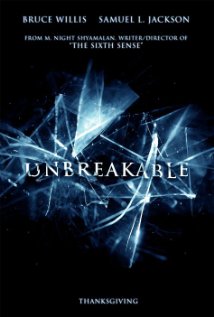
UNBREAKABLE.
US, 2000, 106 minutes, Colour.
Bruce Willis, Samuel L. Jackson, Robin Wright, Spencer Treat Clark, Charlayne Woodard, Michael Kelly.
Directed by M.Night Shyamalan.
If ever there was an unlikely name for a film, let alone a box-office hit, it is 'Unbreakable'. However, such was the faith of the producers in the talented writer-director, M Night Shyamalan, after his unexpected success with The Sixth Sense, that they immediately began production on this thriller, title and all. (In Italy, the film is called Il Predestinato, The Predestined One, which gives it a more ominous and significant tone.)
Bruce Willis plays David, an ordinary citizen, a security guard at a Philadelphia football stadium. He has a wife and son from whom he feels increasingly estranged. In fact, he is returning from New York by train after a search of another job, flirts with a sports agent on the train... But the train crashes. Not only does he survive, but not a bone of his body is broken.
The prologue to the film gives statistics about the popularity of comics in the United States, the number of comics sold per day and per year, so we are pondering the significance of comics as the film opens.
We have also been introduced to a strange character, Elijah, highly breakable, whose arms and legs were broken at birth. Elijah (played by Samuel L. Jackson with great dignity and solemn diction but with an impossible frizzy hair style). It emerges that he is an expert on comics and comic heroes, giving a portentous speech about how all peoples have communicated their myths in drawings (like the Egyptian hieroglyphs) and that some comics are the repositories of popular wisdom concerning the struggle between good and evil. They are illustrations of deep myths.
This means that while the style of the filming is 'realistic', the plot strains belief unless the audience goes along with the basic notion that Bruce Willis is playing a superhuman hero, a comic-strip hero, who has been unwilling to acknowledge his powers, that he is unbreakable, and that he must now accept his vocation and his special giftedness to combat evil. In going along with this supposition rather than being overcritical of its credibility, the audience can get caught up in the sometimes creepy situations, the bewilderment of the hero, his remembering accidents and how he escaped injury and his attempts to love his wife and son again.
The audience can also be sympathetic to Elijah, the broken man in his wheel chair who understands David so well and pursues the hero to accept and fulfil his powerful destiny.
Unreakable is, in its distinctive way, as atmospheric as The Sixth Sense, although its focus is on Bruce Willis rather than on the young boy, something which made the earlier film so appealing and frightening. I thought that Shyamalan would not give the plot a twist this time because audiences would be expecting it. But he does - and, once again, I did not pick it.
By the way M. Night Shayamalan is from an Indian family in Philadelphia. He is now just over 30, a lifetime of movies ahead of him and, if you wonder what he looks like, he does a 'Hitchcock-cameo' in his film as the drug-dealer that Bruce Willis challenges at the football grounds.
Eerie and offbeat thriller offering something to think about.
1. The work of the director, the world of his films, eerie? Fans for his films, those against?
2. The Philadelphia settings, the train, the homes, hospitals, the arenas, galleries? The feel of the city? The musical score?
3. The title, David as unbreakable, Elijah as breakable? The two extremes? Elijah and his using David?
4. The prologue: Elijah, his birth, the reaction of the doctor, that the baby had been dropped, limbs broken, the reaction of his mother? The boy young, kids bullying him, the gift of the comic, the theme of heroes and villains? The adult Elijah, comics, art? The client buying for his little boy, Elijah’s refusal? Elijah’s obsessions?
5. Bruce Willis as David, in the train, flirting, the crash, his being the sole survivor, in the hospital, walking out? Audrey to meet him? Joseph? The fragility of the marriage? His wanting to move to New York, applying for the job, not getting it? Audrey’s response, Joseph trying to deal with the situation?
6. David and his past, checking about his sick days or not, the accident in the swimming pool, phobia about water, the car crash and his giving up football? Falsifying the results to give up the sport for Audrey’s love? The differences in his life, apart? His job insecurity, locker room, the bosses, uniform, co-workers? On-the-job and surveillance?
7. Elijah seeking him out, his theory of opposites, accompanying David, with the queue, the man with the weapons? David’s power, insights? Elijah following him? The effect on David, wanting to break off?
8. Joseph, listening to Elijah, the bond with his father, going to the games? The behaviour at home, wanting to test that his father was unbreakable, the threat with the gun, David’s reaction, Audrey’s reaction?
9. The exhibition, the comics, Elijah’s theory about heroes and villains? His holding Elijah’s hand? The power to see crimes? The visions, the janitor, the abduction, David and the confrontation, the janitor’s death? David and his fears? In the water?
10. Holding Elijah’s hand, meeting Elijah’s mother talking with her? His foreseeing crimes that Elijah was orchestrating, reproducing the train crash, the importance of the train crash for Elijah to meet David?
11. The reconciliation, the marriage, Audrey and her work, healing, the encounter with the Elijah and his broken bones, her understanding the situation?
12. The final information that David had reported Elijah and that he was in a mental institution?
Published in Movie Reviews
Published in
Movie Reviews
Tagged under
Saturday, 18 September 2021 19:58
Cold in July
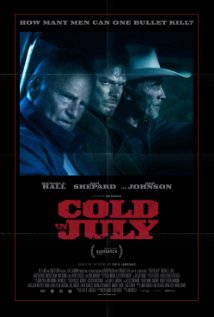
COLD IN JULY
US, 2014, 109 minutes, Colour.
Michael C. Hall, Sam Shepard, Don Johnson, Vinessa Shaw, Nick Damici, Wyatt Russell.
Directed by Jim Mickle.
Cold in July is an evocative title for the film, though one might wonder how it is exemplified in the screenplay.
In many ways, the film is rather unpredictable, which makes it continually interesting, but it leaves quite a number of questions raised unanswered, or left for the audience imagination.
The focus of the film is on a window framer, played by Dexter’s Michael C. Hall, initially playing against Dexter type but eventually having to go into action. He and his wife at home hear noises in the night, and when he searches, nervously putting bullets into his gun, the intruder shines a torch and the framer shoots him. The police are very considerate, taking statements, the framer getting a reputation in his East Texas town (the setting is 1989) as well as newspaper headlines.
The police tell him who the intruder is, son of a prisoner just released. The prisoner goes to the dead man’s funeral and threatens the window framer, especially his son. The ex-prisoner is played by Sam Shepard.
Part of the complication is that the man killed is not the prisoner’s son, that there is a connection to the Dixie Mafia, that the actual son might be an informant against them and in witness protection. The two men decide to find out the truth and the prisoner calls on a buddy from the Korean war, now an investigator, to find his actual son. The investigator is played with some cheerful flamboyance by Don Johnson.
The investigation leads them to a house in Huston, the tough Mexican, a snuff video, the video shop, a warehouse where the snuff movies are filmed and a final violent confrontation.
No real information by the end of the film as to who was actually shot, what the activities of the Dixie Mafia were, any detail of the witness protection… Nevertheless, the film is interesting as an investigation thriller, it is very vigilante action at the end.
1. An interesting prediction: plot, characters, twists, Max?
2. Based on a true story, East Texas, 1989? The feel of the time, homes, police station, shops? Huston? The musical score?
3. Richard, his wife in bed, the noise, the intruder, the, the garden, struggling, the torch and his firing? His reaction, his wife’s? Their son? The police reactions making statements, the headlines in the press, the postman’s comment, Richard and his reputation?
4. The funeral, it, Richard watching? Russell present, to the car, the confrontation? The story of his son, his being in prison? His threats?
5. Price, the police, friendly, the investigation, Richardson the poster was looked at for the moment killed? His fears?
6. Russell, the threats, the reaction of his wife, the thread to be some his being crawlspace, his arrest?
7. The family, at home, the utterly the meal, the sons tantrum and his wife’s reaction, Richard and his response?
8. The police offering protection, reassurance?
9. Russell, in prison, the police, tying them up, out, putting them on the track? Richard following, saving Russell? Taking into the shack, giving him water, the help, explaining the shot was not his son? Digging up the corporate?
10. The background stories, the Dixie Mafia, Frank and his life, in witness protection, giving testimony against the Mafia?
11. The decision of the 2 to search for his son, Richard and his story about going to Houston? Reassuring?
12. Russell: Jimmy, the past in Korea and Russell saving his life, laconic, help? Choose flamboyant style, going to the shop, the picture to be framed? His personality? Going to’s property, the pigs and cattle? His and his connections, the method of eliminating people on the list of the driving licence, the address?
13. Going to the house, the encounter with the Mexican in the fight, taking the video? Watching it, the snuff movie, Russell son involved? Russell looking, his decision – and his shooting practice?
14. Going to the shop, Richard talking to the proprietor, the Mexican coming in, his get out, the following car, finding the location, the role of Frank and his associates, the girl, the building, filming?
15. Going to the vigilante action, in the guns, the final confrontation? Russell, shooting his son, the truth, shooting? Russell is shocked, his death?
16. These returning to normal – but the screw and not answering who the man was that Richard killed, the background of the Dixie Mafia, Frank in witness protection, the role of the police and trying to get rid of Russell?
Published in Movie Reviews
Published in
Movie Reviews
Tagged under
Saturday, 18 September 2021 19:58
About Alex
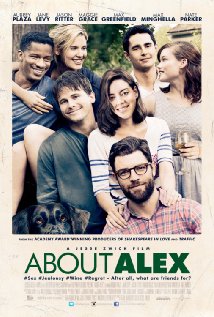
ABOUT ALEX
US, 2014, 99 minutes, Colour.
Nate Parker, Jason Ritter, Maggie Grace, Max Greenfield, Aubrey Plaza, Max Minghella, Jane Levy.
Directed by Jesse Zwick.
At one stage of this film, a character reflecting on the reunion of the group remarks that it is very much like an 80s film. Film buffs will immediately recognise the connection with The Big Chill, where a group of friends gather after the suicide of their friend. In this film it is an attempted suicide.
The film was written and directed by Jesse Zwick, son of the prominent writer and director, Edward Zwick (About Last Night, The Last Samurai, Courage under Fire).
Jason Ritter is the young man who attempts suicide at the beginning but calls the hospital. A number of his friends gather together for a weekend at a country house, wary about how to treat the would-be suicide, some tiptoeing (Aubrey Plaza as an anxious young woman), some very direct (Max Greenfield full of sardonic and direct comments). The couple had been friends for many years, a writer, Ben (Nate Parker) who suffers from writer’s block and has been ignoring the phone calls from his friend, along with his partner, Siri (Maggie Grace) who thinks she might be present pregnant, has a job offer in LA, the couple experiencing some tensions. The other friend is something of a yuppie, Isaac (Max Minghella) who brings along his new young girlfriend (Jane Levy), the others thinking this quite inappropriate.
There are a lot of discussions, tensions, clashes, game-playing, exposés and truths being told. The audience might find it a bit difficult to identify with the characters but most of them are presented interestingly enough so that audiences will be wondering about how they will resolve the difficulties and how the would-be suicide will survive.
1. A film about 20 somethings, 21st century style? Crisis, reunion, truth-telling, resolution?
2. The city, country, the country house, the countryside? Musical score?
3. The focus on Alex, the introduction, getting into the bath, his suit, his texting about being a grave man, the suicide attempt?
4. The group, the introductions? Ben, at work, the editor, as a writer, his ignoring Alex’s phone calls? His relationship with Siri, partners? Sarah, her anxiety? Josh, writing his thesis, his caustic comments? Isaac, up-and-coming, his work, relationship with Kate, the decision to bring her? Alex, recovered, his arrival?
5. The various reactions to Alex, how to treat him, his response, everybody watching him, being careful, except for Josh and his directness?
6. The weekend, the rooms, Sarah cooking, the meals, talk, playing games?
7. Truths and exposé, emotions, their effect?
8. Ben and Siri, the past, the rooms at College, being together? Ben, African- American, quiet, the writer, his block? Siri, pleasant, wondering whether she was pregnant or not, her wanting to go to LA, Ben’s hesitations, Sarah telling Alex about the writer’s block? Discovery she was not pregnant, caught with Alex, Ben upset, driving away, the crash? His confession about not answering Alex’s calls? Alex discovering him writing, the story, inviting him to stay? The reunion with Siri?
9. Josh, sardonic, the past, wanting to tell the truth, direct, literary and cultural references, intelligent, too smart? With Sarah, the past sexual relationship, continuing? Wondering about his thesis and its value? His jealousy of Ben? Drinking, the pot, the truth game, the possibility of change?
10. Sarah, anxious, talking, tiptoeing around Alex, the relationship with Josh, clashes, discussions, the sex? Shopping with Kate? Cooking, the meal? Her dream of the restaurant, her parents’ disapproval, talking with Isaac, the offer of the loan, the decision?
11. Isaac, success, Josh’s comment on his shoes, his decision to bring Kate, the others think it was inappropriate? The past with Sarah, her rebuff in him? Kate, her age, feeling out of place, her work on the phones with suicide attempts, the pot, the drinking, the phone call and her help? Helping Alex to get a job? Isaac and the loan for Sarah?
12. Alex, his explanations, his self-image, Ben, communication?
13. The pot and its loosening the group up? Sarah inventing the game, writing down comments – leading to exposure and the truth?
14. The reference to the 1980s film, this film paralleling The Big Chill, the situation, some of the characters, their appearances?
Published in Movie Reviews
Published in
Movie Reviews
Tagged under
Saturday, 18 September 2021 19:58
Night Before, The/ 2015
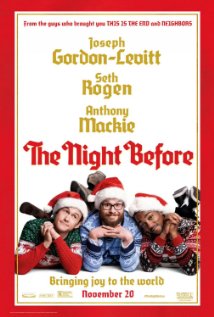
THE NIGHT BEFORE
US, 2015, 101 minutes, Colour.
Joseph Gordon- Levitt, Seth Rogen, Anthony Mackie, Jillian Bell, Lizzie Kaplan, Michael Shannon, Ilana Glazer, Aaron Hill, Tracy Morgan.
Directed by Jonathan Levine.
Might be best to start this review by indicating that it is a variation on the classic It’s a Wonderful Life, though American style of living has vastly and openly altered in many areas from that of small towns in upstate New York in the 1940s. This reference is to indicate that there are some redeeming features in The Night Before, despite initial suspicions to the contrary.
This is one of those raucous, crass, drug-filled American comedies that are so popular in recent years, especially with people like Seth Rogen in the cast. But, if you are not responding to this kind of comedy, and you have the patience, there is some resolution part of the way through and right at the end. The thing is with these crass comedies is that they have their cake and eat it as well: they enjoy indulging in all the raucous aspects of the screenplay, have no holds barred on the coarse and explicit language, and have no problems in their central characters reliance on drugs and hallucinating trips. But the audience which enjoys all this may have quite some difficulties with the ending where there is redemption all-round, confessions of wrongdoing, giving up drugs, wanting genuine romance, extolling marriage and babies, put off by the highly moralising message at the end.
It is the night before Christmas, and nobody is really asleep. We have seen three friends in 2003 consoling one of them, Ethan (Joseph Gordon- Levitt) on the death of his parents in a car crash. One of the friends is Isaac (Seth Rogen) and the other Chris (Anthony Mackie). They have a great desire by 2008 to go to the Christmas Eve Nutcracker Ball but cannot find where it is held. Come to 2015. Ethan has no job and is supplying as an elf carrying the entrees at a Christmas social. Isaac is married to Betsy (Jillian Bell) and they are expecting. Chris has become a champion sportsmen – though relying on steroids. They are still friends but this is to be their last traditional night before celebration.
Whatever the providence, Ethan finds and takes three tickets to the Nutcracker Ball and goes to find his friends. For some reason, Betsy gives a Christmas present to Isaac of some top drugs – which sets him up for the night, on a vivid trip which includes going to midnight mass, getting sick in the aisle, to claiming that the Jews did not crucify Jesus, (a reminder that Christianity is far more tolerant about religious jokes than some other religions we might think of). Chris wants to buy drugs for a white sportsmen (Chris is African American) and they set off to meet the dealer who supplied them when they are in high school. This is Mr Green who turns out to be Michael Shannon, supplying all the drugs, but also giving them a pipe to smoke which projects them into the future, some grim pictures of what they might be, which helps them eventually to change their ways. Michael Shannon is generally an unsettling screen presence and is so here – until we realise who he is and what he is doing (It’s a Wonderful Life), confirmed, as was Clarence, in getting his wings.
A lot of the time is spent in stupid shenanigans, Chris and the sexual encounter with a tough girl who steals his stash and whom he chases through the city; Isaac and his hallucinations; and Ethan wanting to find Diana (Lizzie Kaplan) in order to propose to her - which he does while singing with Miley Cyrus (and James Franco turning up for the Ball). He later has to do a more genuine proposal.
There is also an interlude where they go to dinner at Chris’s mother’s house – she has a shrine to her champion son, wanting him to go to church, but giving them the leftovers from the meal to take to the homeless down the street.
For those devoted to this kind of raucous comedy, no problems. For those not devoted to this kind of raucous comedy, probably best to let it pass. But, if for some reason those unfavourable are watching, there is reconciliation, confession, and firm purposes of amendment by the end of the film – and everyone sitting happily around the Christmas table.
Published in Movie Reviews
Published in
Movie Reviews
Tagged under
Saturday, 18 September 2021 19:58
Polly of the Circus
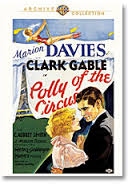
POLLY OF THE CIRCUS
US, 1932, 69 minutes, Black-and-white.
Marion Davies, Clark Gable, C. Aubrey Smith, Raymond Hatton, David Landau, Ray Milland.
Directed by Alfred Santell.
Marion Davies had a successful career at MGM during the 1930s, appearing generally in small budget films but enhanced by her lively presence. She also appeared with Clark Gable in Cain and Mabel.
Here she is a circus trapeze artist, upset by posters with skirts covering her tights, confronting the Reverend and blaming him residents local regulations.
In retrospect, one of the big features of the film is seeing Clark Gable as the Reverend Hartley, quite credible as a priest, devoted to the church, at the service of people, commonsense, sense of humour. He goes to the circus, sees her fall after being taunted by a heckler, allows her to recuperate in the Rectory despite the criticisms of the worker who is suspicious and condemns her. Eagle eyes will notice Ray Milland as the church usher.
Without celibacy restrictions, the couple fall in love, marry, but the congregation does not want her as a minister’s wife so she leaves and goes back to the circus. C. Aubrey Smith is the Bishop and uncle of the Reverend who is strong his judgements but finally relents – and the possibility of a happy ending.
1. A popular film of the early 1930s? The popularity of Marion Davies, comedian? Clark Gable and his career emerging?
2. Black-and-white photography, the American suburbs, small towns, the circus, the Rectory, the church? Musical score?
3. The title, the focus on Polly, the introduction, the posters for the circus, putting skirts pantaloons and corsets on the posters? The troupe in the train, watching, mocking Polly, her anger, assuming that it was the Reverend? Going to confront him? Her background in the circus, skills, the scenes of the trapeze work, her fall? A feisty character?
4. Clark Gable as the Rev Hartley? Credible clergyman? Gable’s image, dressed in clerical collar and suit? His role in the church? His uncle’s advice about moving parish? The encounter with Polly, his pleasant reaction, explaining local legislation, common sense? Saying that he went to the circus, going to the performance, sitting with the children, his response to her fall?
5. Polly, the trapeze artists, their skills, the heckler calling out, her fall, the injuries, difficult to move, going to the Rectory?
6. Downey, alcoholic, working at the church, his bitter attitudes, his criticisms of Polly, accusing her, always suspicious, blackening her name, his drinking, the service in the church, his starting to dust, embarrassing everyone?
7. Her recuperation, the doctor, the housekeeper bringing the meals, their chatting? And her talking with John, his bringing her the Bible, her wanting pictures, the fan magazines? And the recuperating, reading the book of Ruth, being taken by it, quoting it? Her change of heart? Yet the antagonism towards Downey?
8. The challenge, standing, walking, coming downstairs, into the garden? Falling in love with John? He with her? There being no difficulty with celibacy obligations? But public opinion, the congregation not wanting a circus girl as the minister’s wife, the Bishop agreeing?
9. The marriage, in the car and getting the ceremony words mixed up? John and the interview of the job, his not getting it? Her looking at the house, wanting to buy it and set up? His getting the job, selling bibles, little income? His unhappiness, devotion to the church?
10. Her going to see the Bishop, his not wanting a divorce, her decision to leave and return to the circus?
11. John, going after her, the Bishop changing his mind – and the possibility of a happy ending?
Published in Movie Reviews
Published in
Movie Reviews
Tagged under